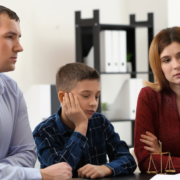I Don’t Talk to My Kids – Reunification Therapy
Not having a relationship with your children can be heartbreaking. Regardless of the circumstances that led to you and your children not speaking, you can attempt to repair the relationship with reunification therapy. This process could even help you resolve custody disputes and allow you to regain visitation with your kids.
Here’s what you need to know.
What Is Reunification Therapy?
Reunification therapy is a form of mental health therapy that aims to restore parent-child relationships. Judges sometimes order reunification therapy to help resolve messy child custody disputes. Courts like parents and children to be involved in each other’s lives, and this is one way to promote a healthy familial unit.
In many families where the parents do not share custody, there is a “favored parent” and a “rejected parent.” Reunifying the rejected parent with the child and strengthening the relationship often requires therapeutic intervention.
During reunification therapy, a therapist works with a parent and their child to improve communication and restore the bond between them. Techniques may include:
- Family systems therapy, which involves resolving conflicts within the family unit
- Education sessions about family dynamics
- Setting boundaries and discussing co-parenting guidelines
Reunification therapy is child-focused and moves at the child’s pace. While the entire family can experience emotional healing through this therapy, the main goal is for the child to find healing and strengthen their relationship with the rejected parent.
Reunification Therapy and Child Custody
Judges often recommend or order reunification for families going through stressful custody disputes. It’s often a necessary method of resolving parental alienation. Alienation happens when one parent turns the child against the other parent to attempt to secure more favorable visitation or custody.
After a family goes through reunification therapy, they may be more willing to concede to split custody. The child may also be happier in the home with the alienated parent.
This process is often slow and involves other steps, such as individual therapy. With these tools, estranged families learn how to restore their relationships while maintaining healthy boundaries.
Who Needs Reunification Therapy?
Not having any communication with your kids is a surefire sign that you could benefit from reunification therapy. Your family may also benefit from this therapy if any of the following are true.
- Your ex has turned your child against you.
- Your relationship with your child has become strained, and the child favors the other parent.
- A judge has ordered reunification therapy as part of your child custody arrangement.
Reunification therapy is sometimes recommended in cases where a parent has been in drug or alcohol rehab, and their addiction has impacted their relationship with their child. In this case, supervised visitation may be safer for the child.
Seek Child Custody Assistance From Karen Ann Ulmer, P.C.
Gaining custody can be challenging if you don’t talk to your kids. Reunification therapy can help. You should also work with an experienced family law attorney to navigate the child custody process successfully while prioritizing your child’s interests.
Contact Karen Ann Ulmer, P.C., today at (866) 349-4721 to schedule a consultation.









